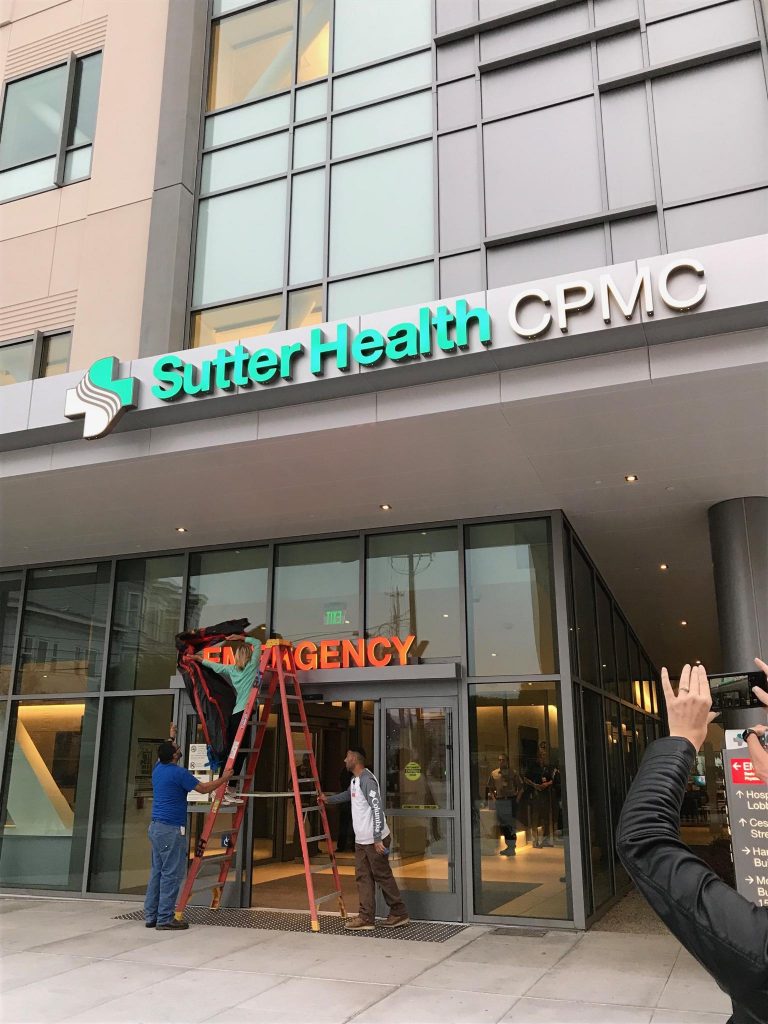Teams will care for the community inside this hospital that features latest technologies, advanced seismic safety and world-class healthcare
 SAN FRANCISCO—The not-for-profit Sutter Health network will officially open the doors to its California Pacific Medical Center (CPMC) Mission Bernal campus hospital Saturday, Aug. 25. This neighborhood-based medical center for all San Franciscans is located at Cesar Chavez and Valencia Street.
SAN FRANCISCO—The not-for-profit Sutter Health network will officially open the doors to its California Pacific Medical Center (CPMC) Mission Bernal campus hospital Saturday, Aug. 25. This neighborhood-based medical center for all San Franciscans is located at Cesar Chavez and Valencia Street.
“For 150 years, we have had the privilege to care for San Franciscans from every neighborhood of our wonderful city,” says California Pacific Medical Center CEO Warren Browner, M.D., MPH. “We are delighted to carry on that tradition and meet the ever-changing needs of our City by the Bay.”
“The new Sutter Health CPMC Mission Bernal Campus is a state of the art facility that will serve San Francisco for generations to come,” said Mayor London Breed. “The grand opening today is a culmination of years of collaborative work between the City, CPMC and the community to ensure that we provide quality healthcare for all of our diverse communities.”
The hospital integrates the latest technologies, advanced seismic safety and world-class healthcare into each of its seven floors. Every detail in its maternity, orthopedics, emergency and elder care services are geared toward creating the ideal patient experience. High quality, technology, safety, efficiency and personal touches are the norm, including:
- Private patient rooms, all with views, including space for a family member to spend the night
- Automated systems admit visitors, protect newborns and support patient safety
- Real-time data verifies staff hand sanitation in and out of rooms and may reduce hospital acquired infections by as much as 40 percent
- Smart pneumatic tube system tracks supplies, medications and blood samples; it reduces errors and improves turnaround time
- The Acute Care for the Elderly (ACE) unit—one of the few such units in Northern California and the first at Sutter Health—offers 19 private, specially-designed rooms in an environment that promotes comfort, safety and independence for patients age 70 and above
- Designed to achieve Leadership in Energy and Environmental Design (LEED) Silver certification: cuts greenhouse gas emissions, drains approximately 360,000 gallons of storm water annually from the storm and sewer system, and captures 50,000 gallons of rainwater to dissipate heat from the HVAC system at the building’s rooftop cooling towers
- Self-sufficient design allows the hospital to operate without city utilities for up to four days
CPMC’s Mission Bernal campus hospital is a 120-bed facility with approximately 215,000 total square feet of acute care, clinical and administrative space that includes:
- 88 medical/surgical unit beds
- 10 intensive care unit beds
- 22 labor/delivery and postpartum beds
- Expanded emergency department with 16 exam/treatment rooms
- Imaging department with CT and MRI
- Seven operating rooms, including two dedicated to obstetrics
The Sutter Health network is proud to continue its community investment with the opening of the new hospital campus, which was on budget and ahead of schedule. The hospital construction hiring process included a unique pipeline for entry-level union apprentices as well as administration, engineering and clerical positons, and internships for San Francisco residents. The construction team also worked with CityBuild Academy and the Construction Administration Professional Service Academy to fill positions and create a Workforce Development Group to support meeting construction goals. The CPMC Mission Bernal hospital campus contracted $65 million to local businesses. Of those hired for construction work, 24 percent are San Francisco residents who were paid $16 million in union wages.
Patients will benefit from being part of the award-winning Sutter Health network, where its doctors, care centers and community programs coordinate to improve access to high-quality, more efficient care. This kind of seamless coordination of medical and support services from one caregiver or health facility to another has proven to reduce complications in care, lower patient readmissions into hospitals, and lower total cost of care.
The full content of this article is only available to paid subscribers. If you are an active subscriber, please log in. To subscribe, please click here: SUBSCRIBE





